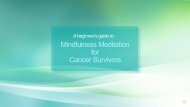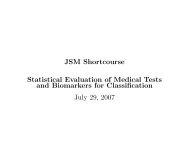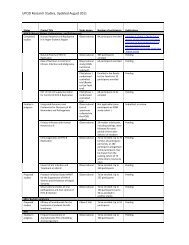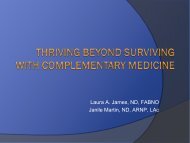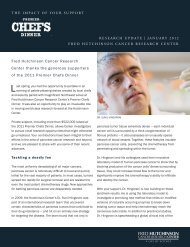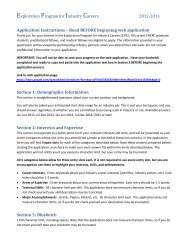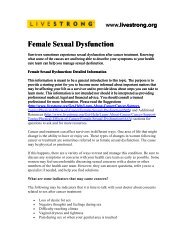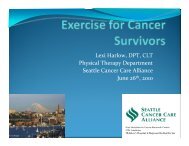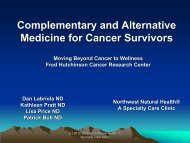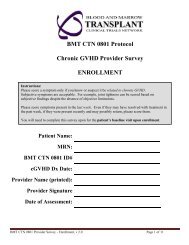Summer Undergraduate Research Program - Fred Hutchinson ...
Summer Undergraduate Research Program - Fred Hutchinson ...
Summer Undergraduate Research Program - Fred Hutchinson ...
Create successful ePaper yourself
Turn your PDF publications into a flip-book with our unique Google optimized e-Paper software.
Medical Medical School Personal Statement Statement Example #9 #8<br />
“Bie jin ta de fang jian (Do NOT enter his room)!” my grandmother warned me<br />
against entering my uncle’s seemingly ordinary room every time I peeked inside. Uncle<br />
XX worked a regular job, interacted with friends and neighbors without maintaining an<br />
unusual distance, and showed no physical signs of illness. Yet during the four years I<br />
lived in Beijing, China, my grandmother denied me direct contact and minimized any<br />
indirect contact I had with him. He had his own sink, tableware, stool, and used a tissue<br />
to handle shared household appliances.<br />
These once puzzling behaviors now drive my commitment to combine my<br />
intrigue with the sciences and the cultural sensitivity I gained from living in China, Japan,<br />
and the United States to train as a culturally competent physician in the field of global<br />
health and infectious disease. I understand now that my grandmother’s caution stemmed<br />
from her desire to protect me from contracting hepatitis B and the ensuing discrimination.<br />
China still bears one third of the world’s hepatitis B burden and social stigmatization<br />
against hepatitis B-positive individuals remains widespread. Even though my<br />
grandmother knew from her experience in pharmaceutical research that hepatitis B is not<br />
transmitted through casual contact, she still felt it necessary to limit my interaction with<br />
my hepatitis B-positive uncle.<br />
My aptitude as a trilingual, culturally-aware physician who can promote mutual<br />
understanding, facilitate a collaborative, trusting physician-patient relationship, and<br />
provide appropriate and effective care also draws from the diligence and dedication I<br />
gained from playing the piano. As a pianist, I spend hours analyzing how the notes and<br />
rests interact with each other and experiment with the different tones a key can produce<br />
depending on how fast it is pressed and released and how much force is applied. These<br />
details often keep me in the practice rooms until late at night. Yet I continue to practice<br />
because piano challenges me to experiment, interpret, and present a musical work from<br />
what some people may perceive as merely black dots on paper. Physicians face a similar<br />
challenge in presenting their repertoire of black dots, or medical knowledge, in ways that<br />
patients of diverse backgrounds can understand.<br />
Pianists and physicians also practice adaptability. Pianos are not easily<br />
transported and I have performed on many unfamiliar pianos in my 17-year musical<br />
career. Before each performance, I methodically test the firmness, tone, responsiveness,<br />
and projection of the unfamiliar keys and adjust my play accordingly. My medical<br />
observerships at the XX XX Family Medical Center and the XX Children’s Hospital<br />
demonstrated that the physician-patient interaction is much like a musical performance;<br />
physicians cannot choose patients or completely control a patient’s health and thus, must<br />
49



